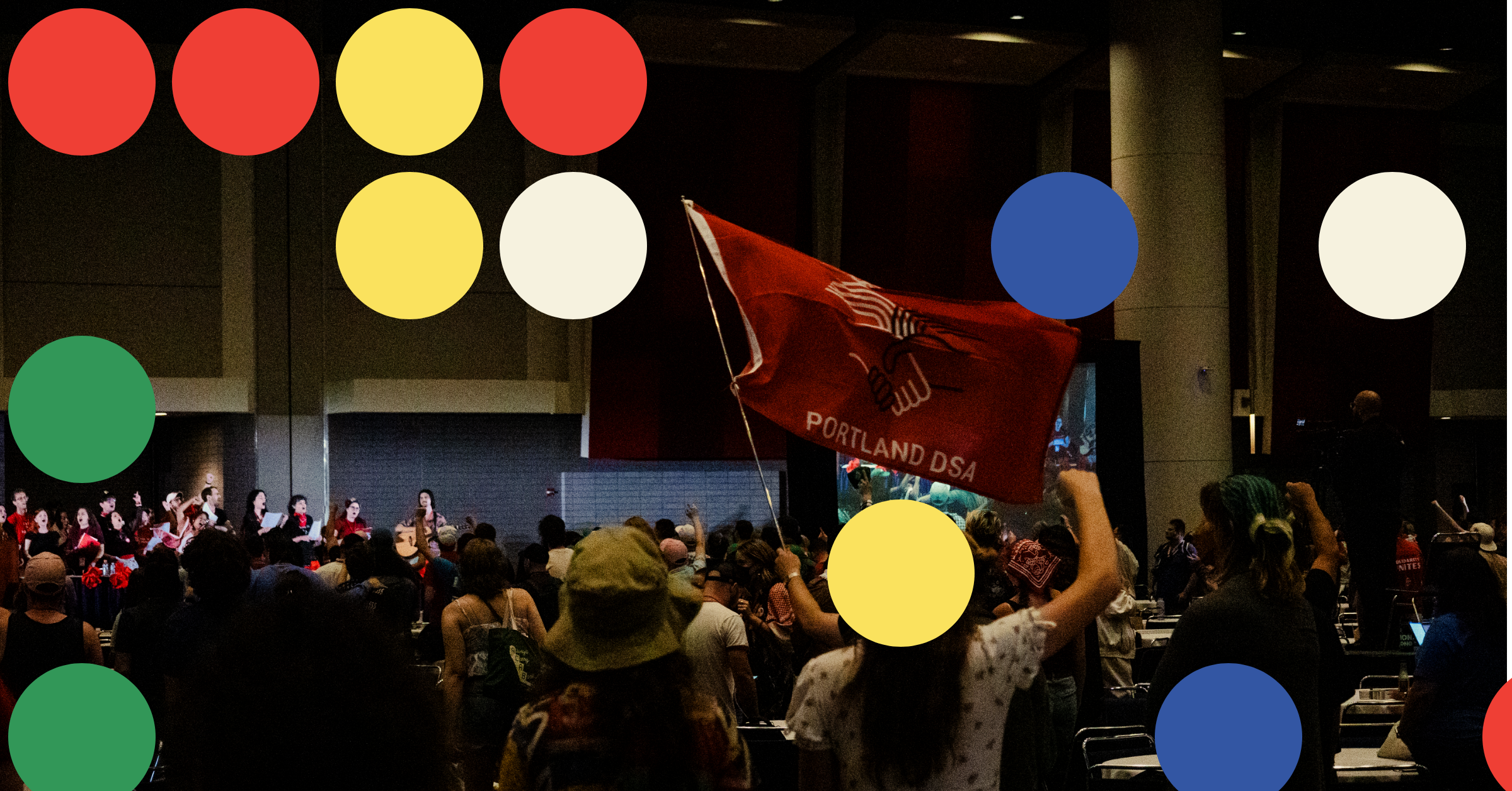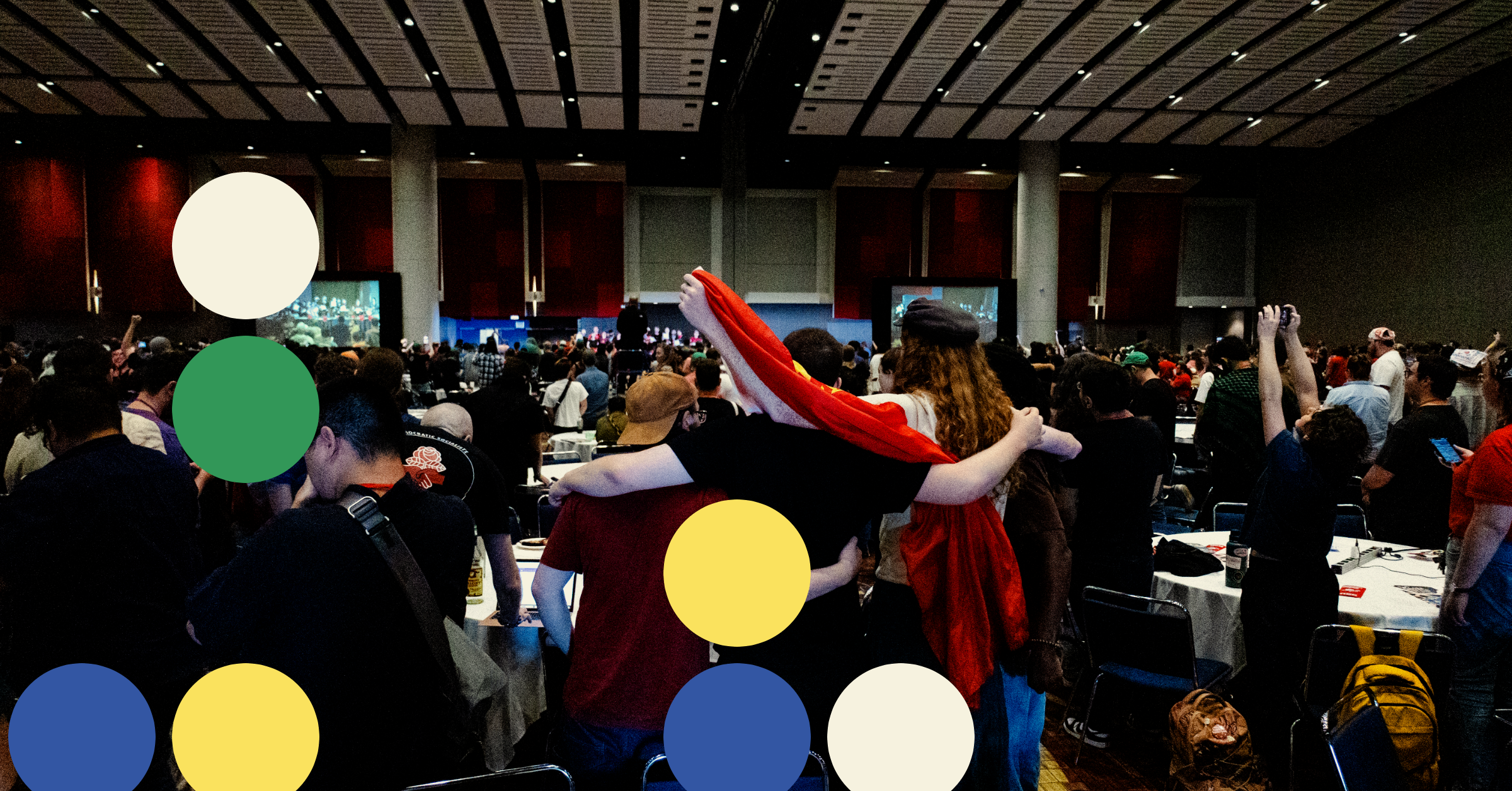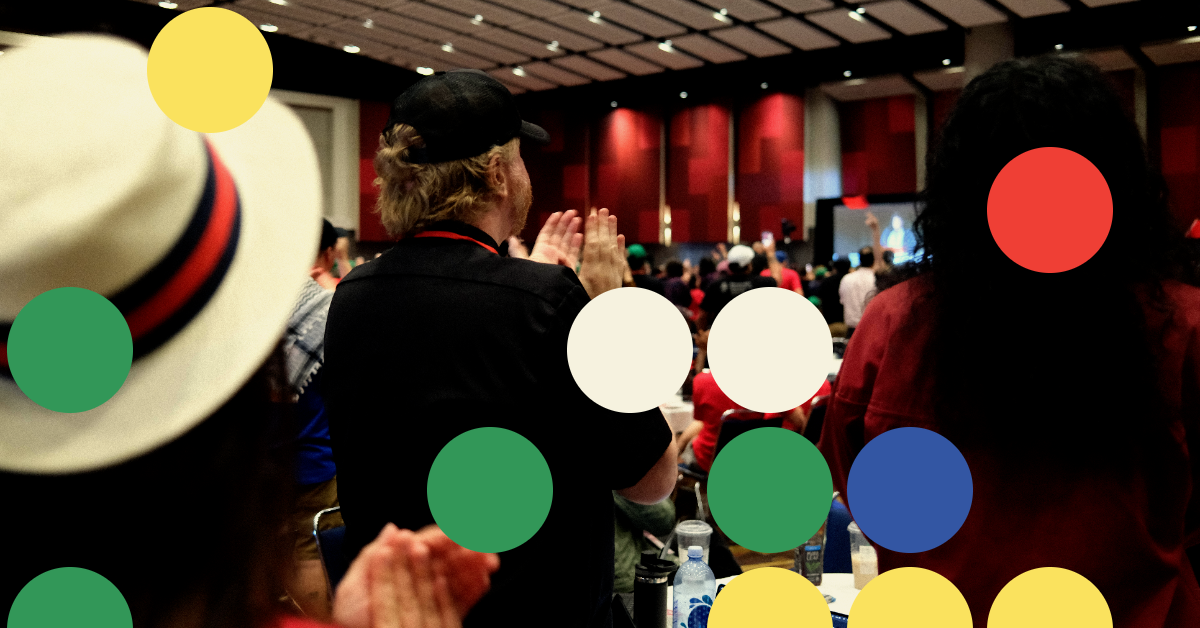I’m going to admit something a little cringeworthy: just how nonprofit-pilled I was when I came into DSA. When I first joined in 2018, I was working in the nonprofit world, and I couldn’t help grating at the phrase I heard all the time: “DSA is not like other orgs.” I’d been organizing since 2011, and suddenly people who didn’t know what a one-on-one was six months ago thought they could change the world, and that their organization was something very special and different. Despite its massive growth, DSA was still tiny and inexperienced. It didn’t have coalition relationships with, say, local environmental justice groups, nor did it seem to want them. Didn’t DSA realize, I thought, that there are tons of nonprofits right in our area who figured this out a long time ago, and whose lifetime organizers deserved some respect?
I joined the operations committee of East Bay DSA, because I knew about nonprofit emails. I waltzed into my first meeting at a comrade’s apartment thinking I’d approach DSA like a new client at the “do-gooder” digital firm I worked at: do an audit, then do everything possible to grow the email list. When some members pushed back on my suggestion to grow the list, I was taken aback: didn’t they know that a list of a couple thousand local folks was so small that it couldn’t do anything for them? They said they didn’t just want random people on the list who clicked on an ad. They said that the people on the list – the members – actually read the emails and, moreover, turned out to events in the dozens, even the hundreds. They said they didn’t want to bend the truth. I couldn’t believe how naive they were. Of course, I was the naive one for believing that an organizational model that lived and died by the strength of its email fundraising could ever challenge the status quo.
Slowly, I began to see what it meant to be in a membership organization. I got confident enough to vote in general meetings. I went to some Night Schools and started to learn about history and political economy for the first time, and I began to unlearn some of my nonprofit-based assumptions. When a member texted me personally asking me to start monthly dues to the chapter, I didn’t hesitate.
DSA Makes Member Leaders
In the seven years I’ve been in DSA, I’ve come to see it as unique in the US Left: it’s a genuine democratic, member-led organization. As Mike Parker put it, “Democracy is about people having power over things that matter.” And in DSA, that’s true, thanks to deliberate, careful cultivation of our internal democracy. We elect our chapter leadership. We elect over a thousand delegates to go to convention and shape the direction of the organization. Where nonprofits have a board, often stacked with corporate bigwigs, that can hire and fire their executive directors, DSA has the National Political Committee, a group of elected members who do the messy, necessary work of leading between conventions – and, crucially, it’s these elected members who can hire and fire staff and direct how members’ valuable dues are spent in fulfillment of the convention mandates members vote for.
DSA is the one place where regular people can learn to be socialists, and learn to be members and leaders of a democratic body. Yes, unions are democratic (some more than others), but only DSA has the potential to lead to a party. And yes, of course we fundraise, but we’re funded by dues, which define membership, not as nonprofits are funded: by wealthy donors or corporations who expect to dictate priorities; by the fleeting one-time contributions of someone who saw an ad online; or even by progressives who dutifully send their $15 a month but will never learn from their pseudo-membership to challenge their fundamental assumptions about how power works, nor how to become leaders or organizers of the movement they support.
I am not writing to criticize readers who work at a nonprofits; if you’re in DSA, you likely already know that, as Eugene Debs put it, the oppressed need justice, not charity. Rather than dissecting the class character or psychology of nonprofits’ workers, or even giving the big-picture critique of nonprofits’ incentive structures, which others have done very effectively, I want to compare the role of members in these organizations to help us understand why only organizations like DSA, with robust democratic membership structures, can hope to challenge the power of capital and send thousands of class warriors out to change the world.
What’s a Nonprofit Member, Anyway?
The key to understanding how the majority of nonprofits work is to understand that the word “member” means almost nothing, confers no power or potential for leadership, and comes with no expectations or support for taking action beyond clicking links, donating, and sometimes calling a representative. In DSA, we pay dues, and in return, we can vote in our chapter’s decisions, propose campaigns and new directions for political work, and elect or run for leadership. Members of most chapters get regular invites to organizer trainings and political education meetings in order to strengthen their skills as activists and “permanent persuaders” of our politics in the world. If your dues are out of date, you can no longer participate in DSA’s democracy. You’re either a member or you’re not.
But in most nonprofits of DSA’s size, “member” is an empty term, a euphemism for “someone whose email we have,” “someone who gave us money once,” or “someone we can mobilize to carry out an action that staff has decided to pursue.” DSA measures its strength by how many members it has because these are the people who we can develop to become socialist organizers and leaders inside and outside the organization. A nonprofit measures its strength by how many emails it has on a list that it can ask for money to carry out tasks that were determined by paid leaders with little to no accountability to these members.
A reliance on paper members is fine for big organizations like Planned Parenthood and for small nonprofits that want to control a local issue space. Paper membership numbers look good in reports to funders, and these members don’t interfere with the direction that leaders want to take the org – usually a direction that won’t threaten their funding or access to powerful friends and future jobs in the Democratic Party and its nonprofit ecosystem.
Claim No Easy Victories, Tell No Lies
Positioning disconnected, disempowered “paper” supporters of a cause as organizational members in this way usually requires comfort with a little bending of the truth. In my work for a mid-size, issue-based nonprofit, I had what should have been a fun task for a junior staffer: I got to code the membership cards for our members. These were not physical membership cards, because the idea of membership wasn’t meant to be serious. They were digital pictures I coded and emailed out. Membership conferred no rights to these people, they didn’t get to vote on the leadership or direction of the organization, they were never supported to become activists or organizers for the cause. Furthermore, the people I emailed them to had never applied for membership, they were simply former donors we were hoping to reengage for another round of money.
Moreover, did these members ever vote on what the organization should prioritize? Did they approve its budget, hire its staff, elect its board, weigh in on its endorsements? You already know the answer: of course not. Most likely, any member “survey” is an engagement tactic to keep people active on a list, so that they’ll contribute money later.
Even if individual workers at many nonprofits would like to see these organizations fight capital, and even though some nonprofits use radical language, nonprofits are structurally designed to ensure they never actually challenge power. As unions and other membership organizations in the US declined with the rise of neoliberalism, nonprofits arose so that a small stratum of professionalized, full-time activists could have a seat, however limited, at the table where legislation gets made. Instead of strikes, we get lobbying.
As Vivek Chibber has argued, nonprofits, rather than channeling working-class demands, actually serve to insulate elected officials from the anger and pressure of the public. Additionally, in order to stay competitive for grant funding to keep the lights on, each nonprofit has to position itself as the leading org in any issue space like housing, environmental justice, education, etc. They will only ever accept DSA as a junior partner in any coalition, because ceding leadership means losing grants, and potentially laying off staff or even going broke. To change the fundamental nature of our society and economy, it will take more than a handful of smart progressives having the ear of decision makers. It will take masses of people, in organization.
DSA Is Different – Let’s Preserve Our Power
So, in the ways that matter, DSA is not a nonprofit. Maybe in fifteen years, if we take what we’ve learned about democratic membership and spread it to our social movements, we’ll be lucky enough to have three or five or ten democratic, member-led organizations with some real muscle in this country. But for now, as rife with contradictions and conflict as DSA can be, it’s uniquely able to be independent and grow socialist leaders, and it’s worth nurturing.
However, the DSA difference will only survive if we preserve it, and our unique nature as a member-led org is facing a challenge at the 2025 national convention. CB02: One Member, One Vote for National Leadership Elections proposes changing who elects our National Political Committee, from elected convention delegates to the full paper membership of DSA. While the authors claim their proposal is in the spirit of the democratizing reforms at the United Auto Workers, from whom they borrow the name “one member, one vote,” the effect of this change would be the opposite of democratizing.
As it stands, national convention delegates elect the NPC, the highest decision-making body between conventions. These delegates are elected by their chapters, which means that the people they organize with in real life have selected them democratically; they are likely to have a significant degree of organizing experience and political development, the very thing that makes our membership model powerful. However, if DSA turns its internal elections into an email turnout contest, we fall into exactly the same structural pitfall that large nonprofits do. Vote whipping of paper members, rather than democratic deliberation at convention, would determine who gets elected to national leadership. To win leadership in the organization, ideological tendencies will be incentivized to treat our membership like a passive email list, rather than engaging in the in-depth political education and leadership development that it takes to grow lifelong socialist organizers.
That’s why we’re encouraging a “no” vote on CB02. Let’s grow tens of thousands more socialists with the politics and organizing chops to fight capital – not move towards a nonprofit model we know doesn’t work.




